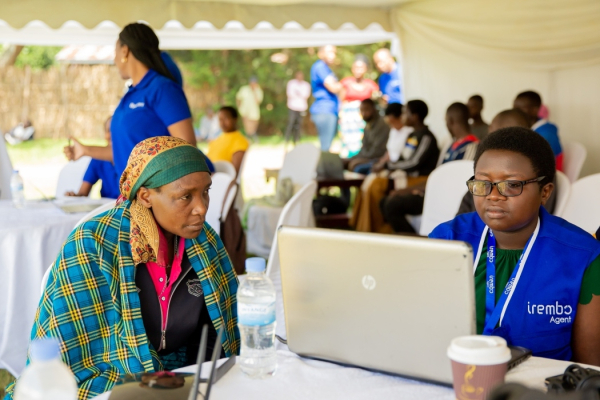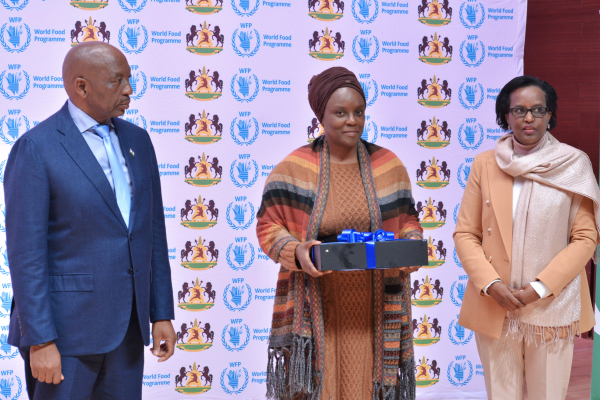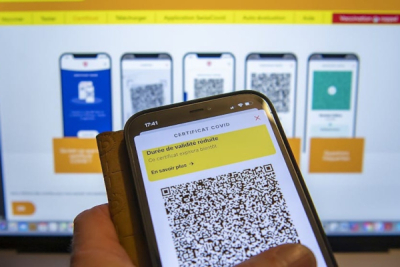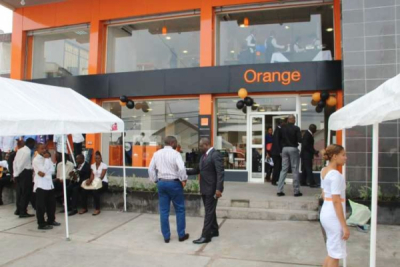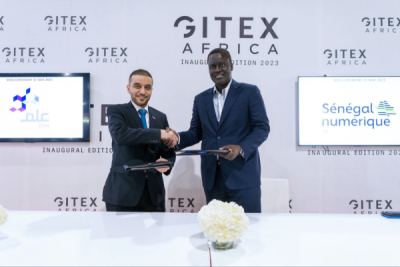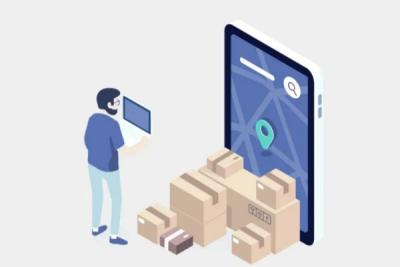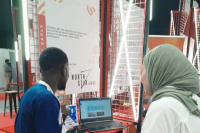In recent years, Rwanda has implemented numerous reforms to advance economic competitiveness. One of the strategies it employed to achieve this feat is the provision of quality services and customer care in the public and private sectors.
The Rwandan government will digitize more than 400 additional administrative procedures by June 2024. The plan was announced by ICT Minister Paula Ingabire, during a session on ICT development with the Senate on Thursday, June 1.
The new administrative procedures will be added to the 103 services already digitized and available on the Irembo portal set up by the government for this purpose. According to Minister Ingabire, the next stage of digitization will be transformational. It will involve digitizing all remaining services, "enabling time efficiency and removing unnecessary costs and processes that come with paperwork or transport as citizens make trips to different government offices.”
To achieve this goal, Rwanda will be supported by a range of partners, including the French Development Agency (AFD), which granted a €37 million loan to support the digitization of public services and innovation in the country earlier this year.
According to Irembo CEO Israel Bimpe, the launch of the Irembo public services platform in December 2015 has enabled the processing of more than 25 million service requests to date. This has saved over 100 million man-hours for both civil servants and Rwandan residents.
The portal employs 7,700 agents in different regions of the country, and more than 1,500 government officials use it to approve and deliver necessary services. As a result, the government has been able to collect RWF 300 billion ($265 million) in service fees.
This new initiative is part of a RWF 13 billion project that began in March this year with the identification of the services concerned. The project is one of the priorities of Rwanda's National Transformation Strategy (2017-2024).
Samira Njoya
Last Wednesday, the United Nations World Food Program (WFP) and the Government of Lesotho launched a GIS (Geospatial Information System) platform to improve evidence-based decision-making on national concerns and overall governance.
The $1.1 million initiative was undertaken as part of efforts to strengthen government capacity on a wide range of issues, including territorial planning, early warning, food and nutrition security monitoring, vulnerability assessment, and analysis.
On Monday, June 5, the World Health Organization (WHO) and the European Commission announced a digital health partnership to establish a global digital certification system. The system aims to enhance international health security.
According to a joint statement from the two parties, this global system will help facilitate mobility and protect citizens around the world against current and future health threats, including pandemics.
Congolese authorities are keen on bringing better connectivity, including the 5G that presents numerous opportunities to African economies, in a context where demand for digital services is booming.
On Tuesday, June 6, telecom operator Orange announced the launch of the first test of its 5G network in the Democratic Republic of Congo (DRC).
The country, which has been connected to Orange's fiber optic network since February, already benefits from superior bandwidth, which will certainly be multiplied with the advent of 5G.
By launching the tests for this new technology, "Orange is expressing its desire to offer its business and individual clients an ultra high-speed mobile Internet connection [...] to meet the ever-increasing need for connectivity,” Orange informed via a press release.
Beyond improving connection speeds, the 5G network will facilitate the emergence of a huge IoT (Internet of Things) ecosystem, improving internet access for billions of connected objects thanks to a balanced compromise between speed, latency, and cost.
This improvement in responsiveness will also open up new prospects for users. These include the emergence of cloud gaming, enabling users to access gaming platforms directly on their smartphones with a smooth, enjoyable experience.
In the DRC, the introduction of 5G, combined with new technologies such as big data, AI, and augmented reality, aims to increase the telecoms sector's contribution to the country's economy. According to the telecom regulator’s mobile market observatory, this high-potential sector grew by 7.18% in the third quarter of 2022.
Samira Njoya
Senegal wants to digitize some 700 administrative procedures by 2025. To achieve that ambitious goal, it tasked the public IT agency SENUM S.A to work with specialized partners to reach the target.
On Thursday, June 1, Sénégal Numérique SA (SENUM SA), the state agency in charge of the management of Senegal's digital infrastructure, and digital company Elm signed a memorandum of understanding in Morocco, on the sidelines of Gitex Africa.
The memorandum lays the groundwork for Elm to support SENUM SA in its mission to leverage technology to stimulate economic growth, improve public services, empower Senegal's citizens, and consequently promote digital inclusion.
"We look forward to developing digital services in Africa. This will open up expansion opportunities, provide innovative services and solutions to strengthen the digital infrastructure and meet the needs of stakeholders," said Majed bin Saad Al-Arifi (photo, left), Elm’s spokesperson and director of marketing.
As part of the partnership, Elm will create advanced digital platforms offering a diverse range of consulting services. The two parties will also build short- and long-term strategic plans to exploit the opportunities available in the market as well as define joint initiatives and projects aimed at strengthening their cooperation over the specified period.
This agreement is part of Senegal numérique SA's efforts to multiply partnerships to further develop its public services platform. For Elm, the protocol is a godsend for achieving its objectives, notably the creation of business opportunities in Africa and the expansion of its regional and international presence.
Since the beginning of the year, SENUM SA has signed several partnerships, including one with the esports promotion agency CONAPES, another one with the national statistics agency, and two others with Transnumerik.
Samira Njoya
After several incubation programs, including Plug and Play and 212 Founders, the Moroccan fintech is now growing rapidly and wants to invest in other African countries.
Hsabati is a fintech solution developed by a Moroccan start-up. Among other things, it enables the owners of very small, small, and medium-sized enterprises (VSMMEs) to track prospecting performance, stocks, invoicing, and finances.
"I've managed several SMEs, I've done consulting and freelance work with SMEs, and they all had the same problem (we didn't have the right tools). Either they were easy to use but too simple and not at all extensible, or they were very complex tools and you had to have a developer on hand. So, after a few months, we had to go back to Excel," founder Saad Kemou told We Are Tech Africa while expanding on the reasons that prompted the creation of Hsabati.
The solution has a mobile application accessible on Android and iOS. Once registered, a user can access the various functionalities that facilitate day-to-day business management. Hsabati is a turn-key solution with functionalities like "CRM", which lets users manage and organize customers and their contacts with all the necessary information, as well as the history of interactions, and "Finance", which lets them keep track of cash flow.
What's more, users can use it without even installing any software and they also need no tech skills. Nevertheless, a premium subscription is required. Its basic package costs MAD149 ($14.62) monthly against MAD249 for the premium package.
Currently, Hsabati operates in Morocco but, it plans to conquer international markets, starting from West Africa. "The simplest and most historic connections are Côte d'Ivoire and Senegal, and then we can expand to the other countries of the West African Economic and Monetary Union," Saad Kemmou said.
Since its launch in 2019, the solution has attracted $600,000 in funding to support its growth.
Adoni Conrad Quenum
Through its programs and events, the startup campus supports entrepreneurs in the development of products, services, and business models. With over 100 hosted, it is one of Africa's largest innovation hubs.
22 On Sloane is one of the largest startup campuses in Africa. The South Africa-based innovation hub is led by Kizito Okechukwu (Executive Director) with a team of entrepreneurs, mentors, scientists, managers, and investors. It offers high-impact start-ups and innovative small and medium-sized enterprises (SMEs), a complete turnkey solution for "scaling up", from initial idea to commercialization, funding opportunities, and access to markets and capital.
To encourage entrepreneurship and the development of new industries as well as contribute to job creation in Africa, it provides entrepreneurs with modern, large-scale coworking spaces equipped to stimulate creativity.
It also offers several programs to help founders progress on their entrepreneurial journey. The most important of these is the 22 On Sloane Incubation Program (designed for already-registered tech companies with less than $135,000 in sales) and the Catalytic Program, an acceleration program designed to help high-impact start-ups in Africa start, launch, market, and grow their businesses.
In addition to these programs, 22 On Sloane organizes events such as the Startup Huddle, during which players meet to discuss challenges, opportunities, and prospects in their respective sectors. The next Startup Huddle will take place on June 15, and discussions will revolve around the online food and grocery delivery industry.
Every six months, the campus publishes a Deal Book of the startups selected for its programs. It has launched over 20 programs and hosts more than 100 start-ups based at its Johannesburg site. To carry out its projects, it has signed partnerships with several institutions including Telkom, Microsoft, the World Bank Group, Venture Capital for Africa, African Business Angel Network, USAID, and the Global Entrepreneurship Network (GEN) Africa.
Melchior Koba
On the sidelines of the Cyber Africa Forum 2023 held in Abidjan last April, Clément Domingo, co-founder of Hackers Without Borders discussed with We Are Tech Africa and Ecofin Agency the specificities of an ethical hacker and his vision for cybersecurity in Africa.
We Are Tech: What is an ethical hacker?
Clément Domingo: An ethical hacker is someone who already likes to tinker, who likes to discover things. Above all, in the digital age, we are now in 2023, it's someone who is going to help companies and governments better secure the data of citizens and users of banks, financial institutions, and large companies.
WAT: How did you become an ethical hacker?
CD: I have an atypical background. I didn’t study to become a hacker per se. I have a classical background. I discovered it bit by bit while studying and I started discussing it with people with good ethics. I can’t stress this part enough because I think that had I come across people who were to send me on the wrong path, maybe I would have become a cybercriminal, not the ones I track daily in my various missions.
WAT: How does Hackers Without Borders work?
CD: Hackers Without Borders was founded in January 2022. The idea stems from the fact that more and more international organizations, NGOs, and humanitarian associations have absolutely no means of ensuring the security of their information systems. Let me give you a concrete example. Presently, there is no one thinking about a specific mother in remote Africa who may be unable to afford even CFAF1000 or 5,000 to feed her children.
So, we asked ourselves how we, in cyberspace, people working in the digital and cybersecurity sectors can provide solutions so that that specific mother can get that money every week or month, through an association, without even realizing that there are complex things behind it. So we founded Hackers Without Borders to do humanitarian work in cyberspace just like Reporters Without Borders, and Doctors Without Borders. Hackers Without Borders helps any NGO, any humanitarian association, anywhere in the world, to better protect its data.
WAT: Do you ever take the initiative of testing the limits or data protection systems of certain organizations to draw their attention to their flaws?
CD: No, not at all. We don't intrude on systems; we intervene when called upon. We always respond to a need or a request. For example, when there are health or natural disasters involving victims, Doctors Without Borders is called in. The organization will never intervene on its own. It's much the same with Hackers Without Borders. We mainly respond to requests, and sometimes, in the course of certain conversations, certain NGO or humanitarian association managers say to us: "We'd still like to test the limits of our system, to find out whether we're secure or not...". Only then do we delegate some of our brilliant members all over the globe, including Africa, to do so.
WAT: In a world where every socioeconomic, and political… sector is connected to cyberspace, how would you sum up your organization's ultimate goal?
CD: The ultimate goal of Hackers Without Borders is to work for cybersecurity, which is not discussed quite often. Right now, things are happening that the general public and even some organizations, companies, and states have no idea about, and even more so in Africa.
Real cyber attacks are paralyzing entire countries. There are real groups of cybercriminals, hackers, what we call state-sponsored hackers, attacking strategic companies in certain countries, attacking states to destabilize them. We aim to talk a little about peace in cyberspace, and how to pacify this fourth dimension that cyberspace has become today. We're working on cybersecurity so that tomorrow we can live in a much more secure connected world. So that when you go to your bank's website or application, all your data is protected. When you download applications, they will be safe.
WAT: I'm assuming that Hackers Without Borders does not count every ethical hacker around the globe in its membership and that some of them take personal initiatives. As the co-founder of Hackers Without Borders, what do you think the role of an ethical hacker should be in society in general?
CD: To answer this question, I'd like to quote Elazraïe, a hacker residing in Israel. She said that today's hackers are the Internet's immune system. I think this formula pretty well represents the very spirit of hacking. We're here to prevent cyber-attacks, to inform the general public, to talk about subjects that are sometimes very complex, but which we simplify and disseminate to make them accessible. For example to my parents who know absolutely nothing about digital technology, to some of my friends, to our children. I think this is one of the main roles of hackers today. Some work in the shadows, others a little more to the forefront to explain all this to ensure our data is safe.
WAT: Can you give us a concrete example of a project or action you carried out as an organization?
CD: During the conflict in Ukraine, we carried out dozens of actions, but there was one that particularly impressed me and some of our members. It was at the very start of the conflict, in the month that followed, when there was a lot of talk about the displacement of populations from Ukraine to the rest of Europe, as I'm based in France, among other places. At the time, several associations and NGOs were also mobilizing to try and connect Ukrainian families with French families. But what many people didn't realize was that filling in a simple form meant providing a whole lot of information that was critical for French families wishing to host other Ukrainian families. On the Ukrainian side, some information also had to be provided. Imagine what would happen if these files and systems were hacked. We were able to help an NGO and two humanitarian associations that were planning to connect French families and Ukrainian families. That had a big impact on me, because we may have saved them the worst. Other ill-intentioned people could have used this data to exploit the digital misery of these families, or even to blackmail French families. It's an action that may speak to everyone, but the importance of which we don't directly realize.
WAT: During the Cyber Africa Forum, there were talks about attacks on banks, public institutions, and so on. How does your organization work with companies to improve their security?
CD: Hackers Without Borders doesn't work with companies at all. But we do have partnerships with them. We aim to help all the NGOs and humanitarian associations in the world, free of charge. But we don't step on the toes of other companies specializing in cybersecurity, because that's not our role. To do that, we have other channels. Hackers Without Borders is focused specifically on NGOs and associations. But, indeed, there's also a real need among banks and businesses. But that's not our job at Hackers Without Borders.
WAT: How does your organization train its members?
CD: First of all, anyone can help, or at least contribute to the cause. If only for a day, an hour, a week, a month, a year. But today, there's a real challenge. It's how to engage people, to ensure that these people are trustworthy. It's a real issue that we don't talk about much, but it is nevertheless a key issue. When we work for organizations, they open all their doors to us. We have access to everything.
So how can we be sure that the person we're working with will remain ethical from start to finish and won't steal data? That's why it's a bit slower to set up an organization like this, which, I'll remind you, is barely a year old. It's a lot more complex than we expected.
WAT: When Ethical Hackers join your organization, do you rely on their raw skills and talents, or do you try to upgrade them so that everyone has the same skills?
CD: First of all, let me remind you that anyone can join Hackers Without Borders but ethical hackers alone cannot run an NGO. Other skills are needed. For ethical hackers who join us, both those who know their way around and those who don't are mentored and coached by others. We have a Discord channel for that and we also hold private or small group exchanges. We have various profiles. Those who are more into attack and others into defense and others more into monitoring. There are a whole lot of jobs in cyber security. I've brought along a special guide to cyber-security professions to this event (Cyber Africa Forum, editor's note). Nowadays, when we say cybersecurity, we're talking about no less than 40 professions. Young people need to know that they can be a cybersecurity consultant. At Hackers Without Borders, we have a bit of everything.
WAT: What challenges are you facing today as co-founder of Hackers Without Borders?
CD: I'm going to take off my Hackers Without Borders co-founder's hat and put on my Ethical Hacker's hat instead. Two days ago, I was in Montreal. I returned to France and got on another plane to come here to Abidjan to talk about cybersecurity differently, because our companies, leaders, and governments don't understand at all what's going on. I'll take the case of ARTP [Senegal's telecom regulator] in Senegal, the West African Bank, which made headlines in Africa and Europe, but also other banks and financial institutions that continue to be attacked. Something is happening in Africa right now. If we don't react by the end of this decade, by 2030, it'll all be over. I may be an alarmist, but we're at a real turning point.
Cybercriminals, who used to concentrate much more on Europe and the Americas, are starting to attack Africa, where there is almost no protection. But we can still reverse the trend and change things.
My main challenge today is to make all our leaders, as well as small, medium, and large companies, aware of the need to arm themselves. Internationally, there's the alliance formed by the FBI, Europol, and Interpol to track down cybercriminals. Why not have similar cooperation with similar agencies in Africa? The realities of West Africa are different from those of Central Africa, the Maghreb, or Southern Africa. But I'm convinced that we can work together. I'm going to mention a reality that speaks to me a lot. The September 11, 2001 attacks in the United States could have been avoided because everyone had the information, except that no intelligence service or national agency in the United States shared the information, and we saw what happened. Similarly, in Africa, if we don't share information through strong partnerships, we will continue to be attacked again and again.
WAT: How do you see the future of cybersecurity and the role of ethical hackers with the advent of new technologies?
CD: First of all, I would like to say that the youth is the future of cybersecurity. It is another battle I care about. There's much talk about digital technologies, a lot of investment, and a lot of jobs, but what are we doing for young people? I'm trying, on a very modest but very concrete scale, to do things here for young people, and above all to encourage our politicians and government officials to join the movement and get things done.
Talking about the evolution of cybersecurity, I can't fail to mention artificial intelligence. It will profoundly change the way we consume digital content. If we don't raise our level of vigilance through training around artificial intelligence, we'll find ourselves 10-15 years behind. It's happening now. There's a profound digital transformation taking place, and we don't realize that, even if we're not in the digital business, we still have a very strong attraction, a very strong adherence to the digital world.
Concerning artificial intelligence, I have a little anecdote about a cybercriminal group I've been monitoring and infiltrating for a few months now. They've set up a new thread with a new topic where they disclose techniques to get around artificial intelligence, which is ChatGPT. For example, when you ask how to create a bomb or how to create a weapon, or how to organize a cyber attack from the ground up, they can easily get you answers to those questions. We need to be aware of this, and so do our politicians, and press for the necessary safeguards to be put in place.
Interview by Moutiou Adjibi Nourou and Muriel Edjo
The new law allows investors to acquire assets such as land and mining concessions using cryptocurrencies. It follows the adoption of Bitcoin as a legal tender in the country and the launch of a national cryptocurrency called Sango coin.
In the Central African Republic, the National Assembly passed, on Monday, May 29 a bill on the "tokenization" of natural resources, which allows investors to acquire assets such as land and mining concessions using cryptocurrencies.
The approval follows the adoption, in April 2022, of Bitcoin as a legal tender in the country and the launch of a national cryptocurrency (Sango Coin) a few months later. The new law "sets the framework for the use of bitcoin and Sango virtual currencies in the investment process, including by foreign nationals wishing to invest in mining, agrarian and forestry titles,” the bill reads. states
The bill adds that investors who purchase these titles "have the right to transfer all accruing annual profits abroad once they pay taxes and various duties.”
"The bill complements the law on cryptocurrencies and, by streamlining [the process], it makes it easy to raise funds for [...] the State [...] and local communities,” explained Guy Samuel Nganatoua, Chairman of the National Assembly's Economy and Finance Committee.
In July 2022, Central African President Faustin-Archange Touadéra announced that Sango coin would catalyze the tokenization of the country’s vast natural resources.
The bill that tokenizes natural resources is not supported by everyone, however. Opposition MPs on the joint commission boycotted the plenary session during which the bill was reviewed. They accused the government of facilitating the sales of the country’s natural resources to “mobs” instead of focusing on improving control to better capture revenues from those vital economic sectors.
In August 2022, the constitutional court ruled that it was “unconstitutional” to buy citizenship, e-residency, land, and natural resources in the country using Sango Coin. But, in October 2022, the president of this court, who also invalidated the presidential decrees setting up a committee to draft a new constitution, was nevertheless retired by an order of the Minister of Public Service.
Sango coin, whose launch coincided with the collapse of the global cryptocurrency market, has so far failed to attract much investor interest. The project also attracted criticisms from the IMF, the World Bank, and even the regional central bank (BEAC).
Critics deem the project unrealistic in a country where internet penetration is around 11% and the electrification rate is just 14.3%.
Africa suffers from inadequate access to education despite the governments’ efforts. To address the challenges preventing access in some regions, tech entrepreneurs create edtech tools but, they are sometimes inadequate to ground realities.
Genoskul is an edtech solution developed by a Chadian start-up. It allows access to online training courses, and tutors. It also allows users to get relevant answers to their questions, thanks to its smart assistant.
Through its Android app, users can register with an email or phone number to access services like virtual classrooms, where they can discuss with other learners.
"The virtual rooms interconnect learners from different backgrounds for an intellectual exchange. They are supervised by qualified teachers for effective preparation for national and international secondary and higher education exams and competitions,” the startup explains.
Genoskul offers courses in a diverse range of professions such as loincloth shoe making, shea butter processing, and rabbit breeding, as well as in public management and sustainable development, and civic action. According to Valery Kagro, founder of Genoskul, everyone should have access to the education and training of their choice, whatever their age or the type of training they aspire to.
To support its growth, Genoskul has raised CFAF5 million (around $8,149). It is also supported by Chad Innovation, an incubator that gave the start-up a stand at the Gitex Africa 2023 in Marrakech, Morocco.
Recently, it told We Are Tech Africa it has over 17,000 users in French-speaking African countries. It also indicated it was planning to create an English and Arabic version of its platform to expand to African countries where these languages are spoken.
Adoni Conrad Quenum
More...
She leverages her expertise and experience in finance to contribute to economic and sustainable development initiatives on the African continent. Through Melanin Kapital, she provides financial support for Africa's green revolution.
Mélanie Keïta (photo) is a Franco-Congolese finance and investment expert. In 2020, she co-founded Melanin Kapital, a carbon financing platform that aims to become the leading fintech platform financing green transition in Africa.
Her Kenya-based financing platform funds the acquisition of clean energy equipment that SMEs need to grow and simultaneously reduce their carbon footprint. The equipment includes electric vehicles, renewable energy equipment, waste management facilities, and green kitchen equipment.
The platform empowers entrepreneurs by helping them access the capital they need to turn their idea into a business. It also trains and coaches them, focusing particularly on women and local entrepreneurs and promotes the use of digital tools.
Mélanie Keïta, who heads that platform as its CEO, is also the Head of Operations at Tuungane Foundation, the non-profit arm of Melanin Kapital that prepares SMEs to access credit and funding from its parent company and other lending partners. She is also a guest lecturer at ESCP Business School, where she graduated with a master's degree in development economics and international development in 2018.
The entrepreneur also holds a master's degree in finance and financial management services, from the ESSCA business school (2016) and an International Certificate in Corporate Finance from HEC Paris (2016).
Her professional career began, in 2015, as an intern in the SME finance department of France's Générale Electrique et Mesures Optiques (GEMO). Since then, she has worked for several finance and investment institutions such as Investisseurs et Partenaires (I & P), 2° Investing Initiative, and Finance in Motion.
A member of the NextGen committee of the 100 Women in Finance network of finance professionals, Mélanie Keïta was listed in Forbes magazine's 2021 Top 30 under 30. In 2022, she received the Top Africa award issued by GITEX, among others.
Melchior Koba
The agreement was signed on the sidelines of the digital summit GITEX Africa, which gave several companies the opportunity to bag agreements.
On Wednesday, May 31, Hicham El Habti, President of Université Mohammed VI Polytechnique (UM6P), and Safia Faraj, CEO of French company Atos signed a collaboration agreement on the sidelines of digital summit Gitex Africa in Marrakech. The agreement aims to strengthen collaboration in the fields of research, innovation, and education, and to support the development of digital talents in Morocco and Africa.
"The two institutions will collaborate on research and development projects, as well as on the organization of scientific conferences or seminars, or the sharing of material and human resources [...] Atos will organize events, open houses, and training courses for UM6P students. It will also connect them with Internship and recruitment opportunities. Similarly, Atos employees will be welcomed at UM6P for engineering and management training courses," reads the press release issued on June 1.
The Moroccan university is multiplying its partnerships to establish itself as a reference in fields relating to digital transformation. With its Stargate incubator, the institution facilitates the emergence of start-ups in the country. In that context, thanks to this new partnership with Atos, it can help the Moroccan tech sector address the tech skills and talent gap.
Let’s note that during GITEX Africa, Atos, a leading digital transformation player in Africa, also signed agreements with Togo to implement a national electronic identification system.
Adoni Conrad Quenum
The United Nations now considers the Internet as a basic necessity in the same category as water and electricity. For some governments, the tool, which demonstrated its importance during the coronavirus pandemic, can become a threat to national security.
On the afternoon of Sunday, June 4, Senegal decided to “temporarily” suspend mobile Internet access. According to the Ministry of Communications and the Digital Economy, access is restricted during certain timeframes due to "the dissemination of hateful and subversive messages in a context where public order is disrupted in some areas.”
Since Thursday, May 1, riots have been taking place in several Senegalese towns. Thousands of young people have clashed with the police and gendarmerie to protest against the two-year prison sentence handed down to Ousmane Sonko, leader of the main opposition party (Pastef). The main opponent to President Macky Sall is considered by the Senegalese youth as the favorite for the February 2024 Presidential election. He was convicted for “perverting the youth” although he was brought before courts over rape and death threats charges.
For his sympathizers, the conviction which renders him ineligible for the upcoming election is a conspiracy to prevent him from running in an election in which he has a high chance of winning with flying colors.
VPNs can no longer be used to circumvent the measure
The temporary suspension affects 17,227,783 subscribers -per the latest figures from the national telecom regulator ARTP. This represents 96.78% of Internet users in Senegal, where the service is essential for cabs, delivery drivers, hairdressing salons, restaurants, online clothing stores, and so on.
In a press release, the association of ICT businesses called on the government to lift all the usage restrictions on instant messaging platforms to guarantee economic freedom since those tools are used by thousands of entrepreneurs to seek “life-saving incomes.”
The temporary mobile internet restriction comes two days after social media access was blocked in the country. The social media ban was issued to restrict the publication of mobilization calls and videos of clashes in several districts of Dakar, Ziguinchor, etc. The restrictions did not produce the desired effect, with most youth using VPNs to circumvent it.
On Friday, June 2, Proton VPN, a virtual private network service developed by Swiss company Proton Technologies AG, noted a huge 30,000% and counting increase in VPN registrations from Senegal.
"This is in line with what we've seen during unrest or geopolitical crises in recent years in Iran, Turkey, and even Russia. The figures we're seeing are comparable to those we saw in Senegal in March 2021. At that time, similar censorship led to a 20,000% increase in registrations," said the company.
Muriel Edjo
The solution was developed by a Cameroonian doctor to offer a customized solution tailored to local realities for affordable access to home healthcare.
Clinic Home is an e-health solution developed by E-santé Cameroun. It enables users to book appointments for home or remote consultations with doctors, general practitioners, or specialists. It also offers home laboratory and online pharmacy services.
Based in Douala, E-santé Cameroun was founded in 2021 by Philippe Ohandja, a trained doctor. Its solution aims to smooth the care pathway. For that purpose, it developed a mobile app -available for Android and iOS users- through which users can register and start booking services. To book the services of a practitioner, they just have to fill a form informing of the type of practitioner they need, when and the type of service they need as well as their conditions.
"Few minutes after payment is made, a teleoperator will call [the user] and forward the call to a doctor who will make an over-the-phone assessment before going to the patient’s home. After the consultation, if necessary, the doctor will ask a nurse to go to the patient for further tests or nursing care,” Philippe Ohandja told We Are Tech Africa at Gitex Africa (May 31-June 2) in Morocco.
If needed, the patient can also buy drugs and directly request for tests right from the mobile app.
A consultation with a general practitioner affiliated with Clinic Home costs CFAF10,000 (around $16.41). The fee rises to CFAF15,000 for consultations at night time or at weekends. Consultations with specialists cost CFAF15,000 at daytime and CFAF20,000 for night and weekend consultations. Teleconsultation, on the other hand, costs CFAF3,000.
The start-up claims around 25,000 users. In 2022, it joined an acceleration program in the Sahel through I&P (investors and partners). Although it has not yet completed a financing round, E-santé Cameroun plans to expand outside Cameroon, starting with Côte d’Ivoire.
Adoni Conrad Quenum


